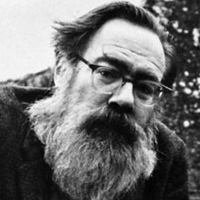John Berryman - Biography and Works
John Berryman is an American poet noted for asserting the importance of the personal element in poetry. Born in McAlester, Oklahoma, and educated at Columbia University, Berryman gained a national reputation with his long poem Homage to Mistress Bradstreet (1956), which took the form of conversations with the ghost of Anne Bradstreet, the first female poet of the American colonies.

John Berryman (1914-1972)
For his book of verse, 77 Dream Songs (1964), Berryman received the Pulitzer Prize in poetry in 1965. This work was continued and completed with His Toy, His Dream, His Rest (1968). The poems in these two books were collected in The Dream Songs (1969). Berryman was awarded a Guggenheim Fellowship in 1967 to complete The Dream Songs. He lived for a time in Ireland and continued to drink heavily, eventually checking into a Minneapolis hospital for alcohol treatment.
Meanwhile, he won the Academy of American Poets and National Endowment for the Arts awards (1967). These awards celebrated his distinctive poetic voice, which the New York Times later describes as "jaunty, jazzy, colloquial … full of awkward turns and bent syntax" (8 Jan. 1972). In his acceptance speech, Berryman explained his iconoclastic style: "I set up The Dream Songs as hostile to every visible tendency in both American and English poetry."After checking into alcohol rehabilitation once in 1969 and three times in 1970, Berryman experienced "a sort of religious conversion" in 1970.
Berryman considered Judaism, professed Catholicism, and wrote Recovery (1971), a vague autobiography about alcoholic rehabilitation. His research on Shakespeare continued; hut the fatal cycle refused to be broken: haunted by his father’s suicide and with his youngest daughter just six months old, Berryman jumped to his death off the Washington Avenue Bridge in Minneapolis. John Berryman is often associated with the confessional school of poetry; a style popular in America during the 1950’s and 1960’s and connected with Robert Lowell, Randall Jarrell, and Sylvia Plath.
In his verse Berryman often sought to turn an experience or feeling into “… something that is coherent, directed, intelligible,” His work bears some relation to confessional poetry in that he dealt frankly with his father’s suicide and his own alcoholism. Berryman also used humor to a great extent, often counterbalancing it against melancholy for a complex effect. Lowell called his poetry “more tearful and funny than we can easily bear.”
Cite this Page!
Sharma, Kedar N. "John Berryman - Biography and Works." BachelorandMaster, 11 Nov. 2013, bachelorandmaster.com/biography/john-berryman.html.
